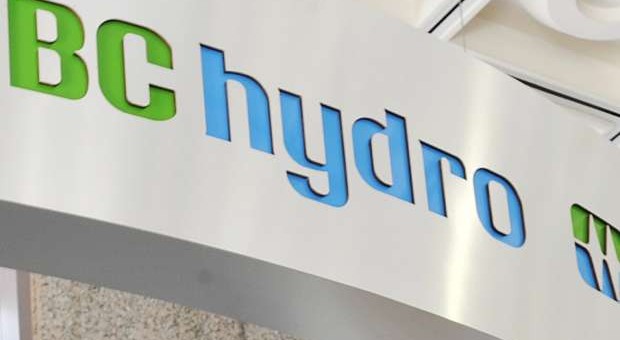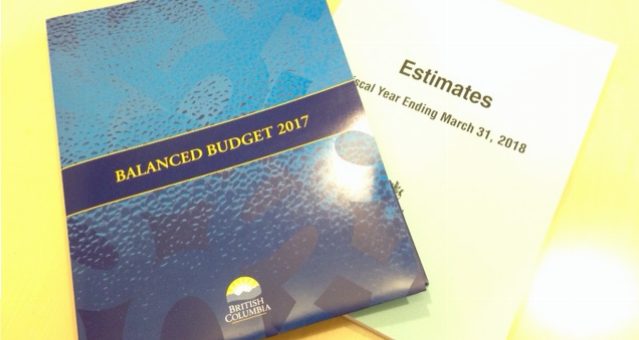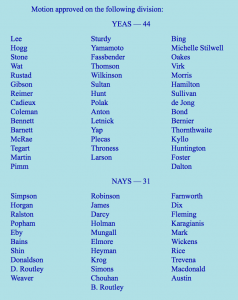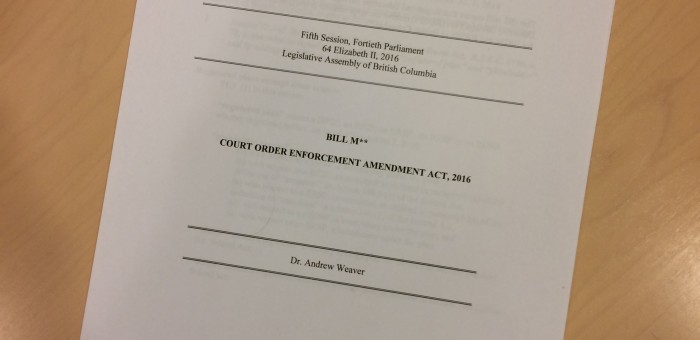Finance
Confusing press release on freezing BC Hydro rates — they’re not actually frozen yet!
Yesterday the BC Government issued a press release entitled Province delivers on commitment to freeze BC Hydro rates. The release states:
The British Columbia government is delivering on its promise to freeze BC Hydro rates, putting an end to the years of spiralling electricity costs that have made life less affordable for B.C. homeowners and renters, Minister of Energy, Mines and Petroleum Resources Michelle Mungall announced today.
You would be forgiven if you thought that this announcement meant that BC Hydro rates were not going to go up next year. Clearly the CBC , Black Press and numerous other news outlets thought this was the case. So imagine our collective surprise during Budget Estimate debates for the Ministry of Energy, Mines and Petroleum Resources when we found out that in fact this isn’t yet confirmed.
Instead, what the government has done is instruct its Crown Corporation, BC Hydro, to ask the independent British Columbia Utilities Commission (BCUC) to consider overturning its already approved 3 percent rate increase for 2018. It is entirely uncertain whether the BCUC will do this given the autonomy of this organization, the very legitimate concerns about the fiscal sustainability of BC Hydro, the ability for intervenors to provide further information and so forth.
As evident in the discussion below, Tracy Redies (MLA for Surrey Whiterock), Mike Bernier (MLA for Peace River South) and I worked collaboratively to unravel what was really going on. It was a very respectful, yet revealing, debate. In the end, both the BC Liberals and I felt it was important for the Minister to issue a clarification so that British Columbians understand that there is still uncertainty as to whether or not rates will be frozen.
Text of Exchange
T. Redies: Minister, today you made the announcement that you’ll be freezing B.C. Hydro rates for a period of one year starting April 1, 2018. That was a little surprising because yesterday you had talked about doing a review and trying to find cost savings.
I’m just curious now that you’re forcing B.C. Hydro into this $150 million hole, how is this going to be made up? Are additional capital projects going to be cancelled?
Hon. M. Mungall: We canvassed this issue quite extensively yesterday with B.C. Hydro staff. The announcement made today was actually exactly what I said we would be doing yesterday. So there’s absolutely nothing different from any of our conversation, any of the questions that the member opposite asked.
All the answers would still stay the same because, at the end of the day, I asked if B.C. Hydro staff can go home to Vancouver, or if they were required to stay to answer any further questions. I was told that there wouldn’t be anymore B.C. Hydro questions.
So I don’t have the appropriate people to go deeper if the member is wanting to do that. I’m happy to take any questions in writing and make sure that I get back to her in a timely manner.
That being said, it’s her time, so if she wants to ask questions, she can. But I’ll let her know now that my answers from yesterday would be the exact same today.
T. Redies: Thank you, Minister, for your answer. I’m just very surprised that you have made an announcement. That’s why we’re back today. You’ve made an announcement, or rather, the minister has made an announcement. Pardon me. The minister has made an announcement that is going to affect the company by $150 million.
Would there have been no discussions with B.C. Hydro in terms of how this would be made up? I mean, you wouldn’t just make a decision about $150 million without having some idea of how this was going to be made up. Surely, the minister must know something.
Hon. M. Mungall: As I was saying yesterday, the rate freeze has always been tied to a review of B.C. Hydro. Also, as I said yesterday, the rate freeze will be starting in April 2018. If it goes forward — we hope that it does — the BCUC, ultimately, is going to be looking at this.
What has happened is that we have collaboratively worked with B.C. Hydro. B.C. Hydro is changing its revenue requirement application from the 3 percent rate increase it had in that RRA for April 2018 to zero percent. They’ve amended their RRA that is currently before the B.C. Utilities Commission.
The B.C. Utilities Commission will then do the due diligence that is required and determine whether a zero rate increase is acceptable. Should it be acceptable, then we will move forward with that rate freeze and conduct a review of B.C. Hydro over the course of that year. Because the rate freeze doesn’t come into effect until April 2018, it actually gives us time, by the time all of the accounting is done in that year of review, to look at ways where we can mitigate any impacts of the freeze.
T. Redies: I’m now very confused. The minister and her government just announced today a rate freeze. But I think, based on her answer, she’s saying it may or may not happen because the BCUC might decide it’s not appropriate. Is that correct? Is there a rate freeze or isn’t there?
Hon. M. Mungall: There is going to be an application for a rate freeze before the B.C. Utilities Commission.
T. Redies: So if it wasn’t a done deal, why would the minister and her government go out with a public release today telling the public that there is going to be a rate freeze starting April 1, 2018? That makes no sense.
Hon. M. Mungall: I’m sorry if the member opposite didn’t feel that I was clear yesterday. I felt that I was. I thought that I was very clear that we would always be going forward to the B.C. Utilities Commission in this very fashion. That was part of the news release that we put out, and it’s what I said to reporters just an hour and a half ago. Members opposite, I do believe, had staff people recording that, so they can go back and see that. But that has always been the process that we talked about — yesterday as well as today.
T. Redies: I know what the process is, Minister. I know what the process is. I’m just confused as to why the minister would go out with a public press release announcing this rate freeze, when she didn’t know whether or not it was going to actually happen. Isn’t that a bit misleading for the public?
Hon. M. Mungall: As I said to the member opposite, the process was clear. It is in the news release. I was clear with all of the media about the process — that we’re bringing it to the B.C. Utilities Commission for review.
A. Weaver: With respect to the minister, I’d like to read the formal government press release. It says this:
“The British Columbia government is delivering on its promise to freeze B.C. Hydro rates, putting an end to years of spiralling electricity costs that have made life less affordable for B.C. homeowners and renters, Minister of Energy, Mines and Petroleum Resources announced today.
“B.C. Hydro rates have gone up by more than 24 percent in the last four years, and by more than 70 percent since 2001. The minister says that in 2016, B.C. Hydro applied to the B.C. Utilities Commission for three years of increases, with a 3 percent increase planned next year, but will be pulling back its request, consistent with this administration’s commitment to a rate freeze.
“‘After years of escalating electricity costs, British Columbians deserve a break on their bills,’ said the minister. ‘From the moment we took office, we’ve taken action to make life more affordable. As part of that, we’re going to make sure that B.C. Hydro is working for the benefit of British Columbians and that its rates reflect that commitment.’
“The rate freeze will provide government the time to undertake a comprehensive review of B.C. Hydro. That review will identify changes and cost savings to keep rates low while ensuring B.C. Hydro has the resources it needs to continue to provide clean, safe and reliable electricity. Details of the scope and process for the review will be developed once government has made a final decision.
“After completing a comprehensive review of B.C. Hydro, any cost and revenue adjustments identified will be reflected in the rates starting in April 2019.
“The rate freeze” — again — “follows government’s commitment in its September budget update to phase out the provincial sales rates on electricity.”
It says nothing about approaching BCUC. It’s very clear, and I concur with the member opposite. I feel that this is quite misleading. I would like the minister to please clarify why the press release says, on the one hand, there’s a rate freeze, and now here today we understand that there’s not really a rate freeze but an application for a rate freeze.
Hon. M. Mungall: He read the press release in full, and he also read directly from the paragraph that talks about B.C. Hydro going to the B.C. Utilities Commission and exactly how the full process is taking place, how it’s tied to a review.
I am sorry that he finds it misleading. I personally am curious as to how he does. I mean, it seemed to be really clear to me.
T. Redies: Now that the minister has gone out with this press release, what does she plan to tell British Columbians if BCUC comes back and says: “No, you can’t have a zero percent rate increase”?
Hon. M. Mungall: That’s a fair question, absolutely, and we’ll cross that bridge when we come to it. We have to go through the B.C. Utilities Commission first. We value the input that the BCUC has in our rate-setting process. We value the input that they have overall in managing our public utility from an independent, expert body looking out for the interests of the public. So we feel that the appropriate process, as defined in legislation and regulation, is to go through the B.C. Utilities Commission first and foremost. We will see what their decision is.
T. Redies: We are not quibbling about the process with BCUC. This is a process that B.C. Hydro has undertaken pretty much every year. They have a regular dialogue with BCUC, and if there are going to be rate increases — I guess now zero increases — they have to get BCUC’s permission. What we’re questioning is why the minister would go out with an announcement that signals, I think, to the public very clearly that they are responding to their prompt campaign promise and they are delivering on a rate freeze when she doesn’t have any degree of certainty that she’ll actually be able to deliver on that.
Hon. M. Mungall: I think that it’s appropriate to bring the public along with government as we take action on a number of items. I think that it’s appropriate to let the public know that we’re taking action on this item that was very important to them.
It was clear on the doorsteps I knocked on and, I’m sure, on the doorsteps the member opposite knocked on — and on any doorsteps in this province — that people are concerned about affordability. Every dollar counts when we’re dealing with an affordability crisis. So we committed to freezing hydro rates as part of our larger package in dealing with affordability. I think it’s appropriate to then tell the public what we’re doing to meet that commitment and be upfront about it, and that’s what we’re doing.
M. Bernier: Just trying to understand and clarify this, then. The minister made an announcement earlier, saying that they’re saving $150 million of taxpayers’ money through the rate freeze. She’s also on record saying that she respects the autonomy of the Utilities Commission. But by this announcement, she’s also admitting, it sounds like, that she’s prejudging the outcome now of that same group of which she says she respects their autonomy.
Can the minister explain to not only this House but to the people in British Columbia, because now we’re really confused: are they saving $150 million right now? Or are they, as she says, just putting the application forward and having to wait now to see what the Utilities Commission is actually going to say and whether they’ll approve that application?
Hon. M. Mungall: So I just want to be very clear for the record that I’m not prejudging, and nobody in this government is prejudging, the outcome at the B.C. Utilities Commission.
What we are doing is the appropriate process, and we are being upfront and honest with the public. I think that is the right thing to do. I think we all in this government think it’s the right thing to do. And so that is what we’re doing.
M. Bernier: So can the minister then clear the air, in the sense of letting the public know and letting this House know: was it an accurate comment for her to make, then, that says that the taxpayers are now saving $150 million? Or is it more of a fair comment to say they’re waiting to see if the Utilities Commission approves their application? At which point, if approved, they might be saving money.
Hon. M. Mungall: Just to clarify. I’m sure the member meant this, but just in case, and for the people who might be watching at home, the savings of $150 million would be felt by ratepayers, not taxpayers. I’m sure the member knows that difference, but I just want to clarify for anybody who might be watching.
Again, I think what is important to note here and what I’ll be sharing — and it sounds like it might be over and over and over again — is that we made a commitment during the election to make life more affordable for British Columbians. We are living up to that commitment.
One of the ways that we said we would do that is to freeze hydro rates. There is a process to go through to get to that place, and we’re following that process, and we’re being upfront and honest with the public about what that process is. We intend to live up to our commitment, absolutely, but we’re going to follow the process to do that.
M. Bernier: So just to the minister, I’m well aware of the process. I managed a utility company — was part of that for 22 years. I worked with the Utilities Commission through rate applications for that entire time, so I’m well aware of it. And every single time, we were always told that we had to wait, because sometimes on a Utilities Commission application, there are opportunities for intervenors, there are opportunities for discussion, there are opportunities on a wide gamut of things.
And you could never prejudge what the Utilities Commission would say. It’s an independent body that’s actually directed to be independent to look out for the ratepayers of British Columbia — as we canvassed yesterday and the minister was quite open on, when we talked about Site C and the role of the Utilities Commission then.
So, again, I’m just trying to understand, because…. The minister is publicly saying that the taxpayers, to make life more affordable, are going to be saving $150 million, but I have yet to hear the commitment. Is she actually directing the Utilities Commission to accept this application? Is the Utilities Commission being told, then, by government that they have to actually put this rate freeze in and accept that?
Hon. M. Mungall: As I’ve said earlier, there’s been no direction to the B.C. Utilities Commission, and should they disagree with the rate freeze, we’ll deal with that when the time comes.
M. Bernier: Is the minister willing to retract her press release and the comments then, because her government has come out and announced that the taxpayers of B.C. are saving $150 million? I think it’s fair now to say, from the line of questioning here and the answers, that they’re actually not. It’s still a maybe.
I know that her government has made promises. I know that her government and the ministry have made commitments. I’m not trying to take away from that. What I’m trying to ascertain is whether those commitments are actually still a pie in the sky. Are they happening? Are we waiting for reviews? Or is she actually telling BCUC what to do?
It sounds like the minister is not directing the Utilities Commission to accept this application. So in essence, is the minister willing to retract the press release and say that in essence, again, the people of British Columbia aren’t necessarily going to be saving $150 million yet?
Hon. M. Mungall: We’re going to have to agree to disagree here. I feel very, very solidly that our press release, everything I’ve said to media and everything I’ve said in this House has been consistent. There is no inconsistency from my perspective. I feel that we’ve been upfront. We’re being transparent. The members opposite may disagree. I’m not really surprised by that. I mean, they’re the opposition, and that’s their job. But we’re going to have to agree to disagree here.
A. Weaver: Before I ask the questions, I’d like to seek leave to make a brief introduction.
Leave granted.
Introductions by Members
A. Weaver: I’d like welcome a group from Vancouver Montessori School here, who are accompanied by their teacher, I understand: Mr. Michael Lee from Vancouver. I just saw them come in the audience, and I thought we’d introduce them and give them a little idea that what we’re debating here is the budget estimates for the Ministry of Energy, Mine and Petroleum Resources. The Liberal members opposite with the Green Party members are debating with government on this particular topic. With that, I welcome you, and I’m sure the rest of my colleagues here would welcome you as well.
Debate Continued
A. Weaver: I’m really troubled by the line of questioning here, and I’m really troubled by what’s being revealed. I have read that press release carefully. It is very clear from that press release that the government is telling British Columbians that they are going to freeze Hydro rates by April 2018. That’s the only message that you can take from this press release. It’s the only message that we took from our no-surprises, good-faith confidence and supply agreement discussions about this issue here.
This is a surprise that we are not actually freezing rates, but we’re going to the BCUC to ask them whether they will give us permission to freeze rates. But we’re not going to influence them on the one hand, because we respect the independence of the BCUC. But on the other hand, we’re saying that we’re saving $150 million. You can’t have it both ways.
So I would like to reiterate the concerns expressed by the member for Surrey–White Rock and the member from Peace River South and suggest that in emphatic terms that I believe that the minister owes British Columbians a formal correction in a press release. I will ask: will she be willing to do that in response to the line of questioning that we have seen here today?
Hon. M. Mungall: I guess, also, the Leader of the Third Party and myself and our government are going to maybe have to agree to disagree in terms of the wording of the press release. I feel it’s very clear. He did read it out. I don’t know what is unclear about that, but I think we’re just going to have to agree to disagree on this.
A. Weaver: The press release should have said this, “B.C. government will seek the ability from BCUC to freeze rates,” not “B.C. government will freeze rates.” But they said, “B.C. government will freeze rates,” and that’s simply not correct. There’s no other interpretation here.
You know, sometimes it’s okay to admit that you’ve made an error, but it is not okay to double down in defence of something that is clearly wrong. Again, to the minister: will she correct this publicly? Because it is misleading, and people across British Columbia think that their rates are going to freeze in April 2018, when they’re not. They’re not going to freeze unless the BCUC says they will.
Hon. M. Mungall: We’ve been canvassing this issue for just over 45 minutes now. I haven’t offered any new information or anything different, and I think we’ve come to the conclusion that this government and members opposite are just going to have to agree to disagree in terms of the wording of a press release.
Video of Exchange
Ensuring the competitiveness of BC’s cruise ship industry
Today in the Legislature we were in Committee Stage for Bill 2: Budget Measures Implementation Act 2017. One of the questions I asked the Minister of Finance concerned the application of BC’s carbon tax to marine gas oil.
As noted in the video and text exchange, reproduced below, I serve on the Select Standing Committee on Finance and Government Services. We recently had a compelling public presentation in Nanaimo from a representative from Cruise Lines International Association – North West & Canada (also reproduced below). One of the issues he raised was the competitive disadvantage that BC ports have been placed in relative to US ports due to an error in the application of our carbon tax.
In what can be only described as an oversight, the carbon tax in BC is only exempt on traditional bunker fuels and jet fuel for international travel (consistent with international reporting rules). However, more modern cruise ships use refined marine gas oil which is not exempt.
I am thrilled with the response I received from the Finance Minister who stated that she is very open to examining this further.
Video of Exchange
Text of Exchange
A. Weaver: I am on the Finance Committee, and we had a very compelling presentation made by representations from the cruise ship industry who have noted that bunker fuels, as per international standards, are exempt from carbon pricing because of the fact that you’re essentially moving from jurisdiction to jurisdiction, and they’re historically exempt. However, modern cruise ships don’t actually use the traditional fuels that are exempt, and they’re under a competitive disadvantage against Seattle, which does not, of course, have a carbon pricing.
My question: is there a consideration for exempting cruise ships who will be using fuels now subject to the carbon tax?
Although, under international reporting regulations or rules, typically multi-jurisdictional travel is not charged with carbon tax — international airfare, for example, international cruise ships and so forth.
Hon. C. James: Thanks to the member for the question. As the member points out, quite rightly, there are already exemptions for interjurisdictional travel that are in place for the carbon tax. But as we’re going through the budget process for February, we know a request and the information has come in. The member sits on the Finance Committee, so it may come forward through that route as well. But we’ll take a look at all of that information as we develop the February budget.
A. Weaver: The Finance Committee has a very broad set of recommendations. I’m not sure something as specific as interjurisdictional travel and fuels with the cruise ship will be in the report. It may, but I’m not convinced. I just bring this to the attention of the minister, if she might consider having a look at this with her staff as we move forward. We wouldn’t want to put our cruise ship industry in a competitive disadvantage against docks in Seattle versus docks in Vancouver.
Hon. C. James: Happy to take a look at it.
Presentation by Cruise Lines International Association – North West & Canada to Select Standing Committee on Finance and Government Services
G. Wirtz: Good afternoon, and thank you for the opportunity.
I am Greg Wirtz. I’m the president of Cruise Lines International Association, North West and Canada. Our association is based in Vancouver, and we represent the cruise lines operating in Canada. Our association has been a pillar of the B.C. economy for decades, with 15,000 jobs associated with B.C.’s cruise industry and some $2.2 billion in economic benefits to our province each year.
Currently British Columbia’s cruise industry is facing some serious competitive challenges. That’s why we’re here today asking for your support for a small change to tax policy that will enhance our competitiveness and further the growth of our industry while reinforcing British Columbia’s environmental leadership and promoting the use of cleaner-burning fuels.
Please allow me to explain. Cruise ships operate in this region typically between Vancouver and Alaska or Seattle and Alaska. Alaska is the marquee destination, and Vancouver and Seattle are the primary home ports. Each year more than one million cruise guests tourists sail to Alaska from either Vancouver or Seattle as home ports. The ships often call at B.C. destination ports, like Victoria, Nanaimo and Prince Rupert as well.
The cruise lines, however, acquire the vast majority of the services and supplies needed by the ships — like fuel, food and other supplies — in the home ports, Seattle and Vancouver. Each home-port call in Vancouver creates $3 million of direct benefits to the B.C. economy. In total, there were more than 230 home-port calls in Vancouver this year alone.
When ships buy fuel for an international voyage, it is normally tax-exempt. This is just like airlines flying on international voyages. The fuel purchased is tax-exempt, recognizing that taxing fuel exports is not good tax or economic policy.
In B.C., cruise lines can purchase what are known as residual fuels, or bunker fuel or heavy fuel oil, for their Alaska voyages on a tax-exempt basis. Cruise lines also purchase cleaner, refined fuel, known as marine gas oil, in B.C.
However, due to a historical artifact of B.C.’s tax legislation, these marine gas oil purchases are only tax-exempt if used in what is called a gas turbine engine. The legislation is more than 15 years old, reflecting that the only cruise ships at the time using marine gas oil were gas turbine ships. Today most ships can operate with the cleaner marine gas oil whether they have gas turbine engines or traditional internal combustion engines. In fact, most cruise ships today are equipped with internal combustion engines, as will be most of the $50 billion in new cruise ships currently on order. Gas turbine ships just have not caught on.
Cruise ships with the much more common internal combustion engines will have to pay three cents per litre on the cleaner-burning fuel when purchased in British Columbia, but not on the less clean-burning bunker fuel. A cruise ship that’s home-ported in Seattle, Washington, does not pay any such tax on their fuel used in international voyages.
As a result, Washington state enjoys a significant fuel-tax advantage over British Columbia in attracting cruise ships, and their passengers, as well as the associated work and supplies needed to support the cruise ships, their thousands of passengers and crew.
In recent years, Seattle has outpaced Vancouver as the home port of choice for cruise ships. There are a number of reasons for this, and a long-term strategy is needed to help British Columbia remain competitive.
However, in the interim, a small, positive change regarding the taxation of cleaner-burning marine gas oil would send a very encouraging signal to the cruise industry that British Columbia remains committed to a sector which contributes $2.2 billion in direct and indirect spending in our province, including $712 million in wages and salaries.
In summary, if British Columbia provides an expanded exemption for the purchase of marine gas oil, it will (1) eliminate a significant competitive disadvantage in attracting cruise ships to British Columbia’s port cities, (2) send a clear signal of support to a key revenue-generating industry in the province and (3) help create jobs in related industries on which British Columbians rely.
I do have copies of a letter and a short backgrounder, which I’d be happy to give to you for your reference. I’d welcome questions, although I acknowledge you can’t ask them.
A Brief Response to the BC Budget
Today in the legislature I rose briefly to respond to the BC Liberal’s pre-election budget. I had originally been scheduled to rise earlier in the week but the cold that I had (which caused me to lose my voice) precluded me from speaking for 30 minutes then. Unfortunately, according to the standing orders, a vote on the budget had to be called this morning. And seeing as some of the speakers took a little longer than we expected, time ran out before a number of us could rise to speak.
Nevertheless I had a little over one minute to outline why I was not supporting the budget. A more thorough response will be given when I speak at second reading of the Budget Implementation Act, the Act that implements the measures contained in this year’s budget.
As one might expect, the budget vote passed 44-31 with the BC NDP and I voting against it.
Below I reproduce the text and video of my response.
Text of My Response
I do recognize that according to standing orders, I have very little time. I just rise quickly to state that obviously, I do not support this budget. This budget is filled with political calculations in an election year.
For example, the MSP premium, which is highlighted in this budget, has a big cut. It’s something you still have to apply for. It’s something that won’t be in effect until 2018. It doesn’t actually eliminate MSP. It still retains the burdensome administrative overhead. There are many, many other examples here.
It’s a budget without a vision. It’s a budget from a government that’s lost touch with the people. It’s a budget from a government that didn’t recognize that its windfall came from an out-of-control real estate sector in Vancouver. Instead of using that money to help those who have been affected by it, through affordable housing, it’s putting it to boutique tax credits for their friends and relatives.
With that, I’ll say that this budget is not something I can support. I look forward to standing with my colleagues on this side of the House and voting against it very shortly.
Video of my Response
Renewing Call to Reform Medical Service Premiums
Media Statement September 15, 2016
Andrew Weaver Renews Call to Reform Medical Service Premiums
For Immediate Release
Victoria, B.C. – While a freeze in Medical Service Plan (MSP) premium increases is certainly welcome, the government has lost the opportunity to fully reform this regressive tax says Andrew Weaver, MLA for Oak Bay – Gordon Head and Leader of the B.C. Green Party.
“British Columbians will see this MSP announcement for what it is, a cynical ploy to gain votes as we head into an election year”, says Andrew Weaver. “We need to eliminate the MSP, not simply tinker around its edges.”
“Over the last three years I have consistently and continually called for the MSP to rolled into the income tax system with premiums calculated on taxable income rather than the current system which is a flat tax no matter what people earn.” says Andrew Weaver. “This would turn a regressive tax into a fair system much like has already been done in Ontario”
In Ontario, if you earn $20,000 or more a year you pay the Ontario Health Premium (OHP). It ranges from $0 if your taxable income is $20,000 or less, and goes up to $900 per year if your taxable income is more than $200,600. Instead of the mail-out system we have in BC, the OHP is deducted from the pay and pensions of those with employment or pension income that meets the minimum threshold.
“Remember – only Ontario’s top earners are paying $900 per year. Right now people in British Columbia are paying $900 a year regardless of whether they earn $42,000 or $4,200,000 a year.”
“As Leader of the BC Green Party I can affirm that a B.C. Green Party government would eliminate the regressive monthly MSP premiums. Instead, a B.C. Green government would introduce a progressive system in which rates are determined by one’s earnings. And a net and substantive administrative savings to taxpayers would arise in rolling MSP premiums into the existing income tax system.” says Andrew Weaver
– 30 –
Background:
Call to eliminate MSP premiums:
Moving Forward with MSP premiums:
Media contact:
Mat Wright – Press Secretary, Andrew Weaver MLA
1 250 216 3382
mat.wright@leg.bc.ca
Protecting disability and education savings plans needs to happen
Media Release: March 15, 2016
Andrew Weaver – Protecting disability and education savings plans needs to happen
For Immediate Release
Victoria B.C. – Andrew Weaver, Leader of the B.C. Green Party and MLA for Oak Bay-Gordon Head, says the changes he proposes in protecting RESPs and RDSPs from creditors are needed in British Columbia.
“I asked the Minister of Justice about this problem in question period two years ago,” says Weaver. “At the time, the Minister said that it was an important issue and that she’d be glad to work with me to move it forward. Yet two years have now passed and still nothing has changed.”
Today Weaver introduced a private member’s bill intituled “Court Order Enforcement Amendment Act”. The bill would add Registered Disability Savings Plans (RDSPs) and Registered Education Savings Plans (RESPs) to the list of plans protected under the act.
Registered Retirement Savings Plans (RRSPs) and Registered Retirement Income Funds (RRIFs) are already protected in BC and most other provinces from creditors in the case of personal bankruptcy. Such protection provides a glimmer of hope that individuals undergoing bankruptcy will not be destitute in their old age.
“If a person files for bankruptcy in B.C., their RRSPs are protected from being seized by creditors,” says Weaver. “However, the same protection does not exist for RESPs or for RDSPs. A child should not have their education investment seized due to misfortune that befalls their parents. Alberta has protected RESPs; we should follow suit.”
“I’ve waited for action on this issue for two years. I haven’t seen any meaningful progress from the government on this simple legislative change, so that’s why I’m proposing it today. My hope is that they finally act on it.”
– 30 –
Media Contact
Mat Wright – Press Secretary Andrew Weaver MLA
1 250 216 3382
mat.wright@leg.bc.ca









